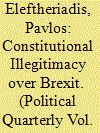| Srl | Item |
| 1 |
ID:
153289


|
|
|
|
|
| Summary/Abstract |
Members and supporters of the British government say that the only constitutionally legitimate course of action over Brexit after the referendum is to press ahead with withdrawal from the European Union, even if that would entail the complete severance of all ties (which we normally call ‘hard Brexit’). A more sophisticated view of the constitution, however, shows that these more or less populist arguments are false. As the Supreme Court confirmed in the recent Gina Miller judgment, the constitution did not change with the June referendum. Parliament is still supreme and determines both ordinary legislation and constitutional change. In fact, if one examines closely the claim that the referendum entails hard Brexit, it becomes obvious that this claim is false as well. The referendum opened the door for one among four different possibilities. Which Brexit option—if any—the United Kingdom should take is a matter for Parliament now to decide, following the normal processes of democratic deliberation and representation.
|
|
|
|
|
|
|
|
|
|
|
|
|
|
|
|
| 2 |
ID:
135206


|
|
|
|
|
| Summary/Abstract |
Just a few years ago, Greece came perilously close to defaulting on its debts and exiting the eurozone. Today, thanks to the largest sovereign bailout in history, the country’s economy is showing new signs of life. In exchange for promises that Athens would enact aggressive austerity measures, the so-called troika -- the European Central Bank, the European Commission, and the International Monetary Fund -- provided tens of billions of dollars in emergency loans. From the perspective of many global investors and European officials, those policies have paid off. Excluding a one-off expenditure to recapitalize its banks, Greece’s budget shortfall totaled roughly two percent last year, down from nearly 16 percent in 2009. Last year, the country ran a current account surplus for the first time in over three decades. And this past April, Greece returned to the international debt markets it had been locked out of for four years, issuing $4 billion in five-year government bonds at a relatively low yield -- only 4.95 percent. (Demand exceeded $26 billion.) In August, Moody’s Investors Service upgraded the country’s credit rating by two notches.
|
|
|
|
|
|
|
|
|
|
|
|
|
|
|
|